Defense & Security
The expansion of jihadism from the Sahel to the coastal countries of the Gulf of Guinea (reprint)
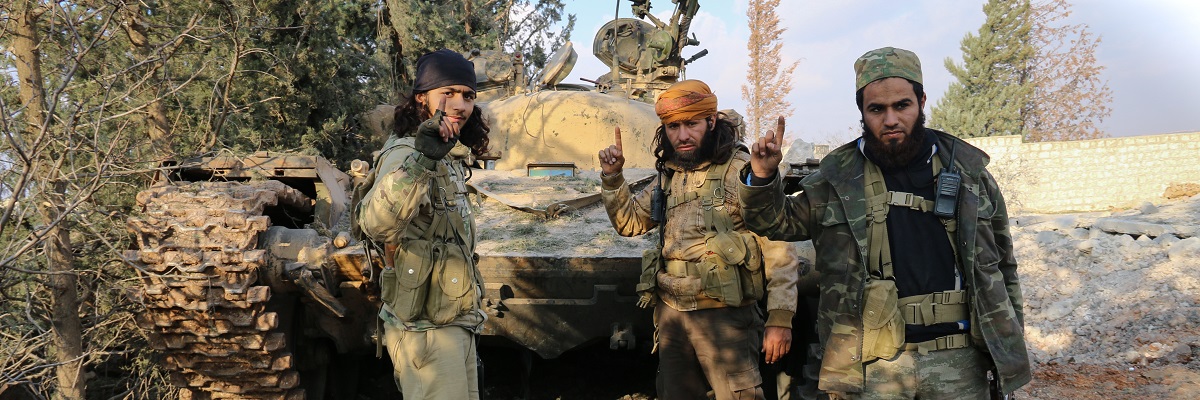
Image Source : Shutterstock
Subscribe to our weekly newsletters for free
If you want to subscribe to World & New World Newsletter, please enter
your e-mail
Defense & Security

Image Source : Shutterstock
First Published in: May.14,2024
Jun.24, 2024
The security crisis affecting the central Sahel is spreading to the northern regions of the coastal countries of the Gulf of Guinea: Benin, Togo, Ivory Coast, and Ghana. Thus, violent incidents and terrorist attacks are crossing the porous borders from Burkina Faso into the coastal states. Between January 2021 and July 2023, 459 incidents — 171 social disturbances and 288 episodes of violence — have been recorded in the northern regions of Benin, Togo, Ghana, and Ivory Coast (Reliefweb, 2023).
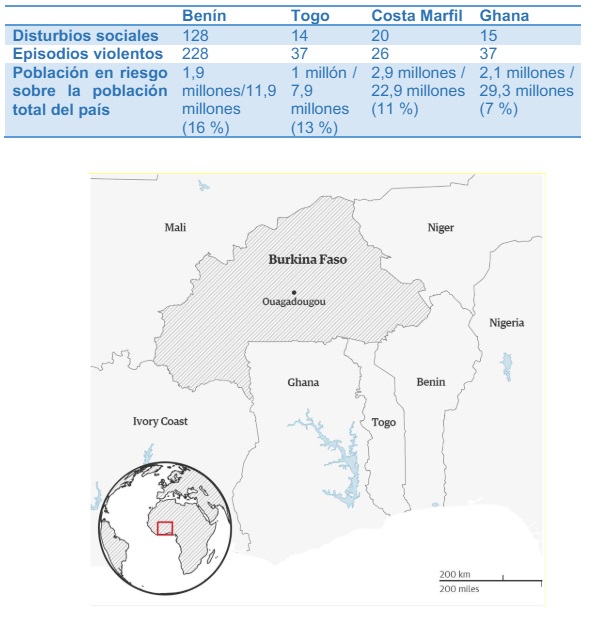
The network of protected forest areas in the region facilitates jihadist expansion. Ivory Coast, Ghana, Togo, and Benin host approximately 588 forest reserves covering around 142,000 km2. 188 of these reserves, including four of the five largest ones, are located within ten kilometers of an international border. In Ivory Coast alone, there are 249 reserves. None of them are separated by more than twenty-six kilometers from a border, and over a quarter of them border another reserve. These protected areas are crucial for preserving the remaining wildlife in the region but are at the center of an unprecedented security problem. As hideouts and routes for acting unnoticed, the reserves are a resource that favors the expansion plans of terrorist groups (Brottem, 2022a). The jihadist[1] group linked to both the Islamic State in the Greater Sahara (ISGS) and the regional franchise of Al Qaeda, Jama'at Nasr al-Islam wal-Muslimin (JNIM), has been operating with impunity in these forest reserves for years. This movement was first observed along the transhumance corridors extending from southern Algeria to these forests on the borders of the coastal states shortly after France began its anti-terrorism operations in Mali in 2013. The local jihadists, familiar with these corridors, moved south in search of safe resting spaces in the forests during the French operations in the Sahel. These forest reserves hinder aerial surveillance, provide access to food and fuel supplies, and facilitate discreet recruitment of young people to join the jihadist cause among marginalized communities (Bernard, 2021). So, groups like JNIM and ISGS have demonstrated their effectiveness in transforming a range of armed actors — bandits, rebels, militants, smugglers, local militias, and poachers — into allied and auxiliary groups, establishing a unity of purpose to undermine state control and facilitate illicit activities (Nsaibia, 2020). The maritime outlets of these four countries and their strategic position favor the establishment of organized crime in their territories, operating in their ports and coasts as logistical and distribution centers. Thus, the Gulf of Guinea and specifically Ivory Coast, Ghana, Togo, Benin, and Nigeria constitute entry and transit points in the routes of arms trafficking and cocaine and other narcotics. Other significant criminal activities include tobacco smuggling, motorcycles, and motor vehicle trafficking. This illicit trafficking directly fosters terrorist activity since, apart from the link between terrorist groups and criminal networks for the acquisition of weapons, a relationship can be established between the illegal flow of certain products and the ‘modus operandi’ of jihadist organizations. The illicit trafficking of fertilizers is an example, as they are introduced as contraband products from Ghana to Burkina Faso and used for the creation of improvised explosive devices (Collado, 2021). Thus, in the northern regions of the coastal countries, there has been a growing presence of jihadist groups that, before committing attacks, undergo a process of local approach and establishment. The arrival of this type of violence in the coastal countries of the Gulf of Guinea is a source of particular concern for the governments of these four countries, as well as for the international community, which fears that the destabilization in the region may lead to new humanitarian crises or exacerbate pre-existing problems. Benin, Togo, Ivory Coast, and Ghana are economically stronger than their northern Sahel neighbors, but they also have weaknesses: factors such as the lack of economic and educational opportunities among youth, ethnic disputes, differences in living conditions between northern and southern populations, or conflicts over land ownership facilitate the potential establishment of terrorist groups (Summers, 2022). Until recently, counterterrorism experts were skeptical of the jihadists' ability to expand along the West African coast because these states, unlike their Sahelian neighbors, are more politically stable and have greater control over their borders. According to this logic, stronger security forces and government structures made jihadism unwelcome. However, while coastal countries are not as fragile as those in the Sahel, they have structural vulnerabilities perpetuated by a north-south division in terms of development and economic opportunities. Underdevelopment prevails in the north due to the distance from economically booming cities near the ports. The north-south gap is exacerbated by poor infrastructure and lack of roads. Northern populations are often deprived of resources — such as access to employment and education — which are available in the more industrialized southern regions (Bernard, 2021). In addition to these socioeconomic and intercommunity differences, a religious factor comes into play: unlike the Sahel, countries in the Gulf of Guinea have a significant Christian population and elites that sometimes tend to marginalize Muslims (Guiffard, 2023).
The activity of jihadist groups in Benin has significantly increased since 2019. The most affected areas are in the northern regions, where the population shares many geographic and ethnic similarities with the neighboring states. In recent years, several jihadist groups have taken advantage of Benin's forests to seek refuge and escape the pressure of regional counterterrorism efforts. A key area is the complex formed by the W-Arly-Pendjari National Parks (WAP), a UNESCO World Heritage site region divided between Benin, Burkina Faso, and Niger. The national parks have often allowed these non-state armed groups to operate undetected, turning the region into a launching pad for their expansion into the West African savanna.
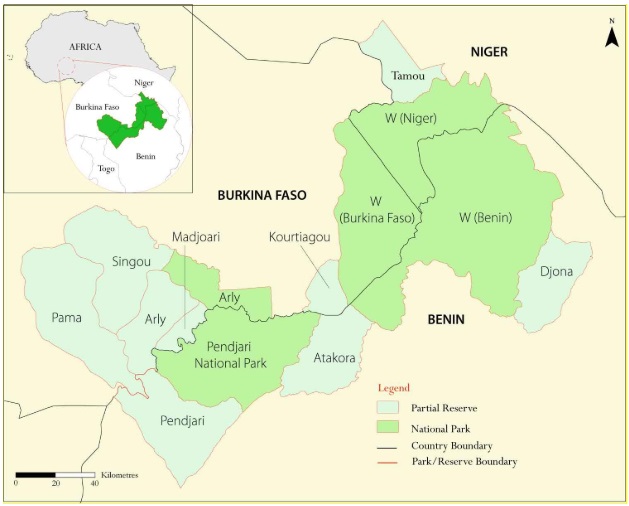
Until recently, jihadist groups had used the area of the W National Park in Benin mainly as a rear base for operations in Burkina Faso and Niger. However, between 2019 and 2023, attacks by terrorist groups were repeated, most of the time against state security forces. The main jihadist groups operating in northern Benin are JNIM, its Burkinabe allied group Ansaroul Islam, as well as ISGS (Cristiani, 2023). The presence of these armed groups in the W National Park is disrupting conservation efforts and local livelihoods, fueling conflicts between farmers and nomadic herders over land and water. These jihadist groups are being effective in recruiting young Muslim herders from Benin, mostly Fulani, with socio-ethnic ties to the Sahel (Brottem, 2022b). This is a peripheral region where its inhabitants have been routinely overlooked by central governments and they lack social services, making these populations particularly vulnerable to infiltration and recruitment by Islamist groups. Over the past three years, there has been a growing influx of radical Islamic preachers facilitating the integration of jihadists into local communities through their preaching and infiltration into local Islamic schools (Lepidi, 2023). The next step is to impose the Sharia law, especially on women, and in some cases, they have already forced underage girls into marriage. Additionally, jihadists are engaging in smuggling activities of various goods such as gold, weapons, or money, and they trade with herds (International Crisis Group, 2023a). As has occurred in neighboring countries, jihadist groups exploit resentment against the state among communities in the border regions of northern Benin, where there is widespread discontent with central authorities. Authorities and official institutions in Benin are often seen as incapable of providing solutions to local problems and are criticized as opaque, discriminatory, and corrupt (Lepidi, 2023). For jihadists, Benin's geographical position is crucial. Its location as an intermediate stop for travelers moving from Mali or Burkina Faso to Nigeria makes it an important stronghold for facilitating the expansion of terrorist groups between Nigeria and the Sahel. Additionally, the fact that Hausa is the common language in northern Nigeria and is widely used in some areas of northern Benin contributes to facilitating cross-border operations of Nigerian bandits and jihadists (Zenn, 2023). The jihadists in northern Benin are taking control during the night. They move in motorcycle caravans with only one headlight on and descend upon villages to attack or engage in illicit activities. Locals note that these unpredictable nocturnal movements allow members of these groups to be intermittently present in many areas, making it difficult for state security forces to respond. The vast dimensions of the national parks on the border between Benin, Burkina Faso, and Niger make monitoring them and providing security in adjacent communities a challenging task. The jihadists operating in this area have displaced civilian authorities and eliminated security agents through threats and attacks. This vacuum leaves local communities even more exposed to kidnappings and extortions (Brottem, 2022a). Government authorities in Benin assure they are taking terrorist threats seriously and claim to have detained seven hundred suspects, most of them from Benin, Nigeria, Niger, and Burkina Faso. The first alarm signal, confirming Benin was in the jihadists' sights, occurred in May 2019 when two French tourists were kidnapped near Pendjari National Park, in Benin territory, by a jihadist group from Burkina Faso. The two were released after the French army intervened, but their Beninese guide was killed (Vidjingninou, 2022). Less than two years later, in February 2021, JNIM carried out its first attack also in the northern part of the country. Among other actions, in September 2022, the jihadists killed two customs officers and kidnapped three government-affiliated individuals, signaling an alarming resurgence of jihadist violence in northern Benin. Meanwhile, in June 2022, JNIM carried out an attack in neighboring Togo, highlighting that the expansion of jihadism towards the West African coast had gained momentum (Zenn, 2023).
On April 7, 2023, the Togolese National Assembly voted to extend the state of emergency in the Savanes region, in the north of the country, by twelve months. The measure was first approved in June 2022 and has been extended since then. The state of emergency reflects the Togolese government's concern about the growing threat of non-state armed groups along the Togo-Burkina Faso border (Agence France Presse, 2023). This extension followed the jihadist attack in February 2023 that claimed the lives of thirty-one civilians in the town of Kpendjal, in the Savanes region (Crisis24, 2023). It is the deadliest attack by terrorist groups in the country's history. Although the attack remains unclaimed, reports by local media suggest that JNIM militants are behind it. Togo recorded its first attack in early November 2021 when jihadists from Burkina Faso clashed with Togolese military forces at a security post in Sanloaga, in the Savanes region (Zenn, 20212). In May 2022, another attack resulted in the deaths of eight soldiers in Kpendjal, on the border with Burkina Faso (Reuters, 2022). Most of the militants' activity in Togo has targeted security forces at rural outposts, although civilians in villages in the region have also been subject to attacks. The northern region of Savanes, with a population of 860,000 inhabitants in an area of 8,600 km2, harbors significant economic, social, and political issues that have facilitated the penetration of jihadist groups from the Sahel: massive unemployment, lack of infrastructure, distance from the central power, a sense of marginalization of rural and northern populations compared to urban elites in the south, and stigmatization and underrepresentation of minority Fulani nomadic communities in local governments. Additionally, it should be noted that the smuggling of light weapons and drugs has become an outlet to alleviate unemployment among the population in the border region with Burkina Faso. In fact, control of the underground economy in this area has become one of the driving forces behind the expansion of jihadist groups into northern Togo (Merz, 2022).
In June 2020, on the border with Burkina Faso, JNIM terrorists carried out the first jihadist attack to hit Ivory Coast since the 2016 shootings at the Grand-Bassam tourist resort by Al Qaeda in the Maghreb. Although the 2020 attack was a rare occurrence in Ivory Coast, it was not surprising, as jihadist militants operating between Burkina Faso and Ivory Coast had been able to grow and develop their capabilities largely due to the limited coordination, up to that point, between the two governments. JNIM militants established their presence in the border region between Burkina Faso, Ivory Coast, and Mali in 2015. Even though organized political violence was sporadic and the network was presumably dismantled by security forces, remnants of these groups maintained their presence in the area (Nsaibia, 2020). In May 2020, Ivory Coast and Burkina Faso decided to join forces to confront the common threat and launched a large-scale joint operation on both sides of the border against JNIM fighters, dubbed as Operation Comoé. The result of the operation was the dismantling of a base of jihadist militants near the village of Alidougou, the death of eight fighters, and the arrest of twenty-four suspects in Burkina Faso and fourteen in Ivory Coast. Weapons, ammunition, USB drives, and mobile phones were also seized in the operation (Jeune Afrique, 2020) A short time after the end of Operation Comoé, on June 11, 2020, JNIM fighters attacked a military post in the border village of Kafolo, killing fourteen Ivorian soldiers. This event demonstrated that, even after a large-scale joint operation, the jihadists were able to regroup and launch, in a matter of days, a devastating attack with a significant number of casualties, in a process much faster compared to the lengthy coordination process between Ivorian and Burkinabe authorities (Nsaibia, 2020). The attack served as a wake-up call for the Ivorian government, which retaliated with airstrikes and soon announced that it had located and arrested the alleged mastermind behind the Kafolo attack. In response to the attack and the persistent insecurity along the northern borders of the country, the government also authorized the creation of an operational military zone in the north to enhance border surveillance and prevent the infiltration of jihadist militants. Ivorian authorities have also established a community police force that works in collaboration with local citizens to relay information to security forces and have undertaken awareness campaigns in the northern regions (Le Figaro, 2020). However, in response to the terrorism problem, Ivory Coast has combined military action with a socio-economic approach by investing in programs aimed at providing social welfare and livelihood opportunities, especially to youth and women living in villages directly threatened by jihadism. Additionally, the government is aware that the country is the largest economy in the Francophone West Africa and maintains close ties with the former colonial power. Thus, Ivory Coast is a showcase of the West, and for jihadists, destabilizing the country would have significant propagandistic value (International Crisis Group, 2023b).
Although in Ghana the jihadist threat may not be as perceptible as among its coastal neighbors, the penetration of jihadists from Burkina Faso into the northern provinces is also a concern. Thus, in the northern part of the country, favorable conditions for recruitment exist: a significant Muslim population and economic difficulties within the community. Ghana is exposed to jihadist activity within its territory due to its proximity to the Cascades region in Burkina Faso and northern region of Ivory Coast. In fact, the growing presence of jihadist fighting groups in the Cascades region, as well as the intensification of a strategy of attacks against neighboring Ivory Coast, make northern Ghana an ideal cross-border region for retreat and control for armed groups, especially because these areas offer access to highly attractive illegal activities such as clandestine gold mining or cattle theft (Merz, 2022). The fact that jihadist activity in Ghana is apparently lower could be related to several factors. The first is that it is the only Anglophone country in the region, which may be hindering (though not preventing) cross-border recruitment by the Francophone jihadists of JNIM (Moody, 2022). Another factor is that the government has taken the threat very seriously and has made significant efforts to improve security. Thus, military presence has been significantly strengthened in the north, where the army strives to involve the local population and encourage citizens to report suspicious incidents near their homes. This was demonstrated especially with the campaign 'If you see something, say something,' which encouraged the local population to call an anti-terrorism hotline if they saw anything suspicious (Africa Defense Forum, 2022a). Despite the anti-terrorism prevention measures, there is evidence that jihadist groups are established in the northern part of the country. Thus, after the military operation Otapuanu in southeastern Burkina Faso in March 2019, in which Burkinabe military forces attempted to dismantle JNIM and ISGS groups, authorities in that country reported that extremist elements had been discovered in northern Ghana. There is also evidence that in the Sahel, there is a considerable number of Ghanaian jihadist fighters. It is estimated that up to two hundred Ghanaian youths have left the country to join jihadist groups in Burkina Faso or Mali and that, in the future, they may return to their home villages to engage in religious proselytism activities. Additionally, everything indicates that JNIM uses Ghana as a resource stockpile area, particularly motorcycles, which suggests that jihadists are likely already familiar with the terrain of the country (Moody, 2022). In November 2019, military forces from Ghana and Togo detained one hundred and seventy suspected jihadist militants on Ghanaian territory near the border between both countries. This was part of a joint security operation, called Koudanlgou III, which objective was to thwart terrorist plans and other criminal activities that the detainees were allegedly involved in (Ghana Web, 2019). In October 2022, Ghanaian security forces detained an Islamic cleric and twelve of his followers for alleged terrorist activities in the town of Nangun, in the Karaga district. Apparently, the individuals had ties to a jihadist group in Burkina Faso (Geopolitical Report, 2022). In April 2023, one thousand special forces troops from the Ghanaian army were deployed to Bawku in the Upper East region after three immigration officials were shot, one of whom was killed (My Info Gh, 2023).
Following the kidnapping of two French citizens and their guide in Benin in May 2019, the country's authorities questioned whether they had done everything in their power to confront the terrorist threat. Despite warnings, the Beninese government had not strengthened security in the border area. Regarding Pendjari National Park, it was only monitored by forest guards from African Parks, a South African NGO. State security forces were not present, even though this forest reserve borders the Arly Forest and the Pama department in Burkina Faso, known to be hotspots for criminal groups and jihadists (Barry, 2019). In response to the increasing threat, the coastal states of West Africa have been adopting a military approach in the fight against terrorism by enhancing cross-border security. Thus, over the past two years, Ivory Coast, Ghana, Togo, and Benin have expanded troop deployments in their northern regions. These coastal states have relatively small armies ranging from ten thousand to sixteen thousand personnel and are generally not sufficiently trained and equipped. The governments of these countries have shown particular interest in acquiring drones for border surveillance and conducting targeted attacks. Additionally, they are seeking to strengthen regional bilateral relations to carry out joint operations and share information (Stratfor, 2022). In the realm of international organizations in West Africa, multilateral institutions and initiatives face two problems: insufficient funding and disputes and rivalries among their members, which limit effective cooperation and coordination in the fight against terrorism. The main initiatives comprising the regional security architecture are the G5 Sahel Joint Force (which is expected to disappear following the new security pact signed in September 2023 by Mali, Burkina Faso, and Niger, consolidating the shift towards Russia and the expulsion of France) (Al Jazeera, 2023); the Economic Community of West African States (ECOWAS) Standby Force; the Multinational Joint Task Force combating Islamic State in West Africa (ISWAP) and Boko Haram in the Lake Chad Basin; and the Accra Initiative, a multilateral security cooperation mechanism established by Benin, Burkina Faso, Ivory Coast, Ghana, and Togo in 2017, which also includes Mali and Niger as observer members. Five years after its creation, the Accra Initiative has agreed to assemble a multinational military force to help curb the spread of jihadism. This operational force will consist of ten thousand soldiers, the majority of whom will be stationed in Tamale (Ghana), with an intelligence component in the Burkinabe capital, Ouagadougou. Despite the recent withdrawal of European forces from the Sahel, the Accra Initiative has received €135 million from the European Union. It is estimated that the joint multinational force requires $550 million to operate effectively, and member states hope that, in addition to the European Union, funding can be provided by the African Union, ECOWAS, and Britain. Nigeria has agreed to join this initiative as an observer and provide air and logistical support (Africa Defense Forum, 2022b). Additionally, according to a German newspaper published last August, EU foreign ministers have already reached an agreement to launch a civilian-military mission in the coming months in Ivory Coast, Ghana, Togo, and Benin. The number of police officers and soldiers to be deployed in the Gulf of Guinea has not yet been defined, as the mission is pending official approval by the community institutions. According to the source cited by the German newspaper, there is concern among European countries that jihadist groups will expand their activities in the region and destabilize the coastal countries of the Gulf of Guinea. The governments of Benin and Ghana have already issued the necessary invitation for the European mission to establish itself in their territory (Schiltz, 2023).
The political instability and coups d'état in the Sahel countries, which have led to the withdrawal of French military presence from Mali, Burkina Faso, and Niger, offer new opportunities for jihadist groups to expand their positions, spread across the territory, and thereby increase their ability to threaten the coastal countries of the Gulf of Guinea. On the other hand, the trajectory of the Wagner Group mercenaries’ presence in the Sahel is uncertain following Prigozhin's death, but in any case, Russian paramilitaries do not appear to be the solution to the region's security crisis. The political fragility of the coup governments in the Sahel and regional insecurity will mutually reinforce each other, and it is to be expected that the jihadist threat to Benin, Togo, Ivory Coast, and Ghana will continue to grow. However, several factors could hinder the progression of jihadist groups further south, starting with the need to forge local alliances. Jihadist groups are numerically small, which makes it difficult for them to hold territory. One of their main strengths lies in the alliances they can establish locally, through persuasion or threat, with local leaders and marginalized communities. However, as jihadist groups move southward, they will find it difficult to establish lasting bases and gain support from inhabitants of predominantly Christian regions. Additionally, they will lose much of their ability to move undetected among the local population. Nevertheless, the recent wave of coups d'état in the Sahel has demonstrated that it is not necessary for jihadists to spread throughout the entire territory of a country to create a crisis that leads to a failed state and chaos (Walther, 2023). From what is highlighted in this chapter, it is evident that preventing the terrorist threat depends on military decisions and actions, but also on better political and social integration of the populations living in the peripheral regions of the north. Although there may not be a deliberate policy of discrimination, the sense of marginalization seems to be one of the reasons why young people from these regions decide to collaborate with or join the cause of jihadist groups. The counterterrorism response should involve strengthening the social and investment presence of the state in the northern regions of these countries with the aim of improving access to basic services or employment opportunities, and also by enhancing dialogue between security forces and the population. In this conflict, nothing is yet decided, and it will be crucial, to prevent jihadist expansion in the region, for the cooperation of West African countries in regional organizations such as the Accra Initiative and ECOWAS. Likewise, military collaboration with the European Union will be of great assistance, as many of its countries are currently concerned (and would be affected tomorrow) by the expansion of the jihadist threat in the Gulf of Guinea.
----------------------------------------------------------------------------------------------------------- [1] Jihadism is a type of ideology characterized by the frequent use of terrorism with the aim of restoring the original greatness of Islam both spiritually and politically. This restoration involves the re-Islamization of Muslim societies from the strictest orthodoxy and the aspiration to create political structures that uphold and promote the realization of these principles. The scope of action may be solely regional, but all lines coincide in the desire to achieve the unity of all Muslims, and the willingness to spread Islam throughout the world. (https://www.wikiwand.com/es/Yihadismo).
· Africa Defense Forum (2022a). Dans sa lutte contre l’extrémisme, le Ghana exhorte ses citoyens à dire quelque chose s’ils voient quelque chose. Africa Defense Forum. Disponible en: https://adf-magazine.com/fr/2022/06/dans-salutte-contre-lextremisme-le-ghana-exhorte-ses-citoyens-a-dire-quelque-chosesils-voient-quelque-chose/ (2022b). Accra Initiative Takes Aim at Extremism’s Spread. Africa Defense Forum. Disponible en: https://adf-magazine.com/2022/12/accra-initiative-takes-aim-atextremisms-spread/ · Agence France Presse (2023). Togo Extends Northern 'State of Emergency. Agence France-Presse. Disponible en: https://www.voaafrica.com/a/togoextends-northern-state-of-emergency-/7040918.html · Al Jazeera (2023). Mali, Niger and Burkina Faso establish Sahel security Alliance. Al Jazeera. Disponible en: https://www.aljazeera.com/news/2023/9/16/mali-nigerand-burkina-faso-establish-sahel-security-alliance · Barry, Diawo (2019). Menace jihadiste: Bénin, Togo et Ghana à l’heure de la mobilisation générale. Jeune Afrique. Disponible en: https://www.jeuneafrique.com/mag/776657/politique/menace-jihadiste-benintogo-et-ghana-a-lheure-de-la-mobilisation-generale/ · Bernard, Aneliese (2021). Jihadism is spreading to the gulf of guinea littoral states, and a new approach to countering it is needed. Modern War Institute. Disponible en: https://mwi.westpoint.edu/jihadism-is-spreading-to-the-gulf-of-guinea-littoralstates-and-a-new-approach-to-countering-it-is-needed/ · Brottem, Leif (2022a). Jihad Takes Root in Northern Benin. The Armed Conflict Location & Event Data Project. Disponible en: https://acleddata.com/2022/09/23/jihad-takes-root-in-northern-benin/ (2022b). The Growing Threat of Violent Extremism in Coastal West Africa. Africa Center. Disponible en: https://africacenter.org/spotlight/the-growing-threat-ofviolent-extremism-in-coastal-west-africa/ · Collado, Carolina (2021). Evaluación de la amenaza yihadista y sus posibilidades de expansión en el golfo de Guinea. Revista Internacional de Estudios sobre Terrorismo. Disponible en: https://observatorioterrorismo.com/eedyckaz/2021/08/5-Evaluacion-de-laamenaza-yihadista-y-sus-posibilidades-de-expansio%CC%81n-en-el-Golfo-deGuinea-Carolina-Collado.pdf · Crisis 24 (2023). Togo: Attack in Kpendjal Prefecture, Savanes Region, Feb. 10. Crisis 24. Disponible en: https://crisis24.garda.com/alerts/2023/02/togo-attack-inkpendjal-prefecture-savanes-region-feb-10 · Cristiani, Dario (2022). Jihadist Violence Grows in Benin. The Jamestown Foundation. Disponible en: https://jamestown.org/program/jihadist-violencegrows-in-benin/ · Geopolitical Report (2022). Islamic cleric, 12 others arrested on suspected terrorism charges. Geopolitical Report. Disponible en: https://www.geopolitical.report/islamic-cleric-12-others-arrested-on-suspectedterrorism-charges/ · Ghana Web (2019). 170 persons arrested at Ghana-Togo border over suspected terrorism, illegal mining activities. Ghana Web. Disponible en: https://www.ghanaweb.com/GhanaHomePage/NewsArchive/170-personsarrested-at-Ghana-Togo-border-over-suspected-terrorism-illegal-miningactivities-800980 · Guiffard, Jonathan (2023). Gulf of Guinea: Can the Sahel Trap Be Avoided? Institut Montaigne. Disponible en: https://www.institutmontaigne.org/en/expressions/gulfguinea-can-sahel-trap-be-avoided · International Crisis Group (2023a). Containing Militancy in West Africa’s Park W. Crisis Group Africa Report, 310. Disponible en: https://www.crisisgroup.org/africa/sahel/burkina-faso-niger-benin/310-containingmilitancy-west-africas-park-w (2023b). Keeping Jihadists Out of Northern Côte d’Ivoire. Crisis Group Briefing, 192. Disponible en: https://www.crisisgroup.org/africa/west-africa/cotedivoire/b192-keeping-jihadists-out-northern-cote-divoire · Jeune Afrique (2020). Opération antijihadiste conjointe Côte d’Ivoire-Burkina: Abidjan salue d’excellents résultats. Jeune Afrique. Disponible en: https://www.jeuneafrique.com/987353/politique/operation-antijihadiste-conjointecote-divoire-burkina-abidjan-salue-d-excellents-resultats/ · Le Figaro (2020). Attaque djihadiste: la Côte d'Ivoire crée une zone opérationnelle militaire dans le Nord. Le Figaro. Disponible en: https://www.lefigaro.fr/flashactu/atttaque-jihadiste-la-cote-d-ivoire-cree-une-zone-operationnelle-militairedans-le-nord-20200713 · Lepidi, Pierre (2023). Au Bénin, la lutte antidjihadiste fait craindre une stigmatisation accrue des Peuls. Le monde. Disponible en: https://www.lemonde.fr/afrique/article/2023/01/27/au-benin-la-lutte-antidjihadistefait-craindre-une-stigmatisation-accrue-des-peuls_6159588_3212.html · Merz, Rafael (2022). The jihadist threat in northern Ghana and Togo. KonradAdenauer-Stiftung. Disponible en: https://www.kas.de/en/web/westafrika/laenderberichte/detail/-/content/thejihadist-threat-in-northern-ghana-and-togo-2 · Moody, Jessica (2022). Jihadist Attack on Togo Highlights Threats to Neighboring Ghana. The Jamestown Foundation. Disponible en: https://jamestown.org/program/jihadist-attack-on-togo-highlights-threats-toneighboring-ghana/ · My info Gh (2023). Government deploys 1,000 Special Forces to Bawku following deadly attack on immigration officers. My Info Gh. Disponible en: https://myinfo.com.gh/2023/04/government-deploys-1000-special-forces-tobawku-following-deadly-attack-on-immigration-officers/ · Nsaibia, Héni (2020). In Light of the Kafolo Attack: The Jihadi Militant Threat in the Burkina Faso and Ivory Coast. The Armed Conflict Location & Event Data Project. Disponible en: https://acleddata.com/2020/08/24/in-light-of-the-kafolo-attack-thejihadi-militant-threat-in-the-burkina-faso-and-ivory-coast-borderlands/ · Reliefweb (2023). Outil de veille multirisques pour les pays côtiers d’Afrique de l’Ouest. Reliefweb. Disponible en: https://reliefweb.int/report/benin/outil-de-veillemultirisques-pour-les-pays-cotiers-dafrique-de-louest-benin-cote-divoire-ghanatogo-granit-au-31-juillet-2023 · Reuters (2022). Eight soldiers killed in Togo, raising spectre of first deadly Islamist attack. Reuters. Disponible en: https://www.reuters.com/world/africa/eightsoldiers-killed-attack-north-togo-government-says-state-tv-2022-05-11/ · Schiltz, Christoph (2023). EU plant zivil-militärische Mission in Westafrika. Welt. Disponible en: https://www.welt.de/politik/ausland/article247127834/Golf-vonGuinea-EU-plant-zivil-militaerische-Mission-in-Westafrika.html · Stratfor (2022). How Coastal West Africa Is Responding to an Expanding Jihadist Threat. Stratfor Worldview. Disponible en: https://worldview.stratfor.com/article/how-coastal-west-africa-respondingexpanding-jihadist-threat · Summers, Marta (2022). Actividad yihadista en el Magreb y en el Sahel occidental. Anuario del Terrorismo Yihadista 2022. Disponible en: https://observatorioterrorismo.com/eedyckaz/2023/07/ESPANOL-ANUARIO2022_final.pdf · Vidjingninou, Fiacre (2022). Bénin: l’étau terroriste se resserre au Nord. Jeune Afrique. Disponible en: https://www.jeuneafrique.com/1292906/politique/beninletau-terroriste-se-resserre-au-nord/ · Walther, Olivier (2023). Sahelian jihadists go? Mapping Territorial Transformations in Africa. Disponible en: https://mapping-africa-transformations.org/how-far-southwill-the-sahelian-jihadists-go/#MAPTA · Zenn, Jacob (2021). Togo Suffers First Al-Qaeda Affiliated Jihadist Attack». The Jamestown Foundation. Disponible en: https://jamestown.org/wpcontent/uploads/2021/11/TM-pdf-Draft-1.pdf (2023). Benin Becomes Bulwark Against Terrorism in West Africa. The Jamestown Foundation. Disponible en: https://jamestown.org/program/brief-benin-becomesbulwark-against-terrorism-in-west-africa/
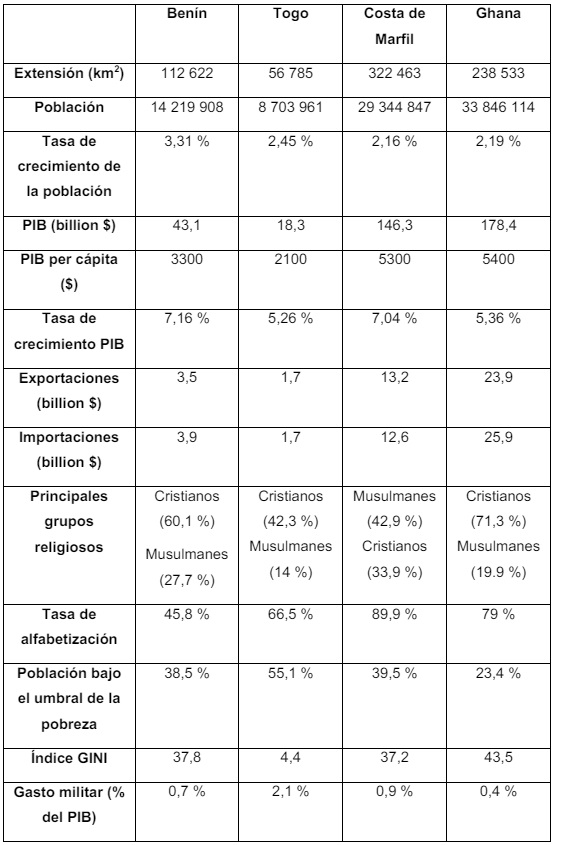
Table: Demographic, Economic, and Social Indicators. Source: https://www.cia.gov/the-world-factbook/
First published in :
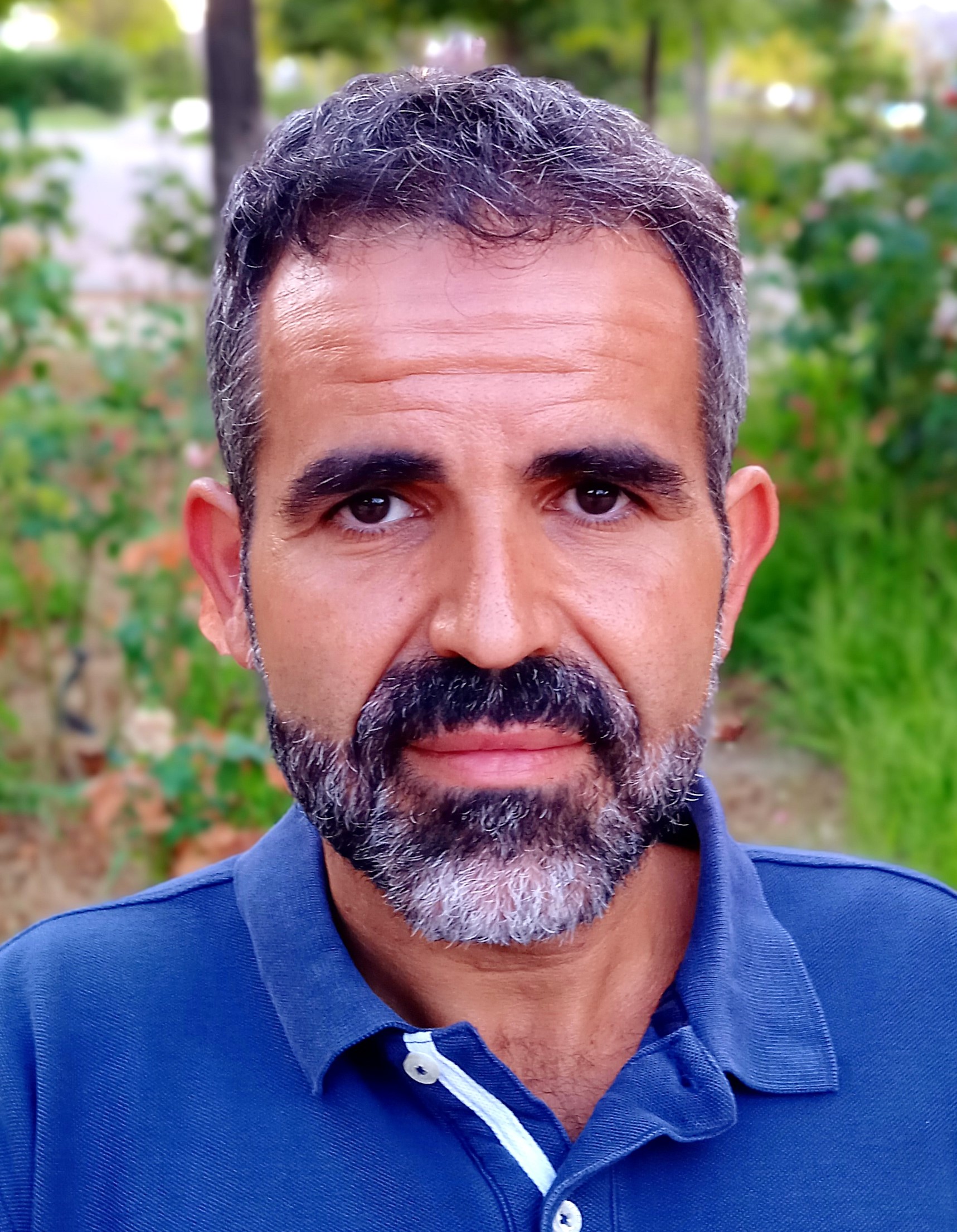
Analyst at the Spanish Institute for Strategic Studies (Ministry of Defense of the Government of Spain). Area of research: Sub-Saharan Africa (since 2020-currently). PhD in Peace and International Security and Master in International Studies. Degree in Political Science and Journalism.
Unlock articles by signing up or logging in.
Become a member for unrestricted reading!